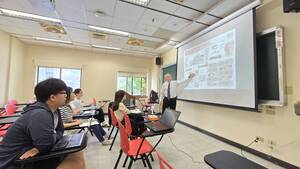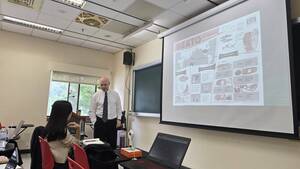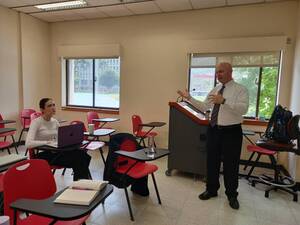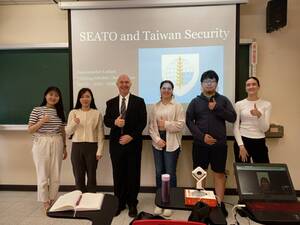SEATO and Taiwan: Taiwan’s Security in the South-Eastern Region




Date :
2024-05-13
Department :
International Master's Program in International Communication Studies
【Article by IMICS】
In a thought-provoking guest lecture delivered on May 3, 2024, retired United States Air Force (USAF) Foreign Area Officer Guermantes Lailari, with expertise in the Middle East, Europe, counterterrorism, irregular warfare, and missile defense, offered invaluable insights into the Southeast Asia Treaty Organization (SEATO) and its significance for Taiwan’s security. The speech, titled “SEATO and Taiwan Security,” was hosted as part of the International Organization class at the International Master’s Program in International Communication Studies (IMICS), instructed by Dr. Chyungly Lee. Notably, Dr. Chiew-Ping Hoo, a visiting fellow in the Institution of International Relations at National Chengchi University, was the moderator of this event.
Lieutenant Colonel Lailari commenced the speech by addressing that his agenda is to introduce the backgrounds of several regional organizations, including SEATO, the North Atlantic Treaty Organization (NATO), and other alliances currently influencing the Indo-Pacific region. As he put forward NATO and its most important Article 5, he elucidated that such organization posed an impact on the foundation of SEATO, “especially after the 9/11 event, when this Article 5 was firstly evoked.” He also emphasized the special part of NATO lies in that the terms for protection only apply to soil connected to Northern America. “While Alaska is applicable, islands in the Pacific like Guam do not fit,” he said.
The speech came to its highlights as Lieutenant Colonel Lailari shared insights about SEATO and why it is closely related to Taiwan’s security. “The first Taiwan Strait Crisis happened around the time when SEATO was created, making this organization unique,” he explained. The purpose of this organization was to defend against open armed suggestions and subversion, especially the spread of Chinese Communism, and also to improve the economic and social conditions of its member countries. Lailari further drew an example that Thailand decided to join SEATO due to the discovery that the People's Republic of China (PRC) had established the Thai Autonomous Region in Yunnan Province, located in the southern part of China. “This clearly indicated the move that PRC intended to destabilize the current regime,” he added.
Focusing on the security issue over the Taiwan Strait, Lieutenant Colonel Lailari furthermore brought up the topic of the ‘Davis Line.’ Also known as the ‘Median Line’, this intangible line was created by Benjamin Oliver Davis, a Brigadier General in the US military, and delineates territory to prevent crossfire across the Taiwan Strait and serves as a baseline for U.S. mediation. “While the United States backs Taiwan with the seventh fleet, if Taiwan leans towards unification and actually takes actions, the United States will not play along,” Lailari annotated, explaining the purpose of the United States creating this line.
The International Organization course at IMICS aims to equip students with a comprehensive understanding of international organization and global intergovernmental cooperation, empowering them to analyze international affairs with nuance and depth. As this International Organization course moves onto the part of realizing the powers that are conquering or aiding the southeastern region, this lecture from Guermantes Lailari undoubtedly offers an array of invaluable perspectives, enriching students’ understanding with profound expertise and abundant resources.
In a thought-provoking guest lecture delivered on May 3, 2024, retired United States Air Force (USAF) Foreign Area Officer Guermantes Lailari, with expertise in the Middle East, Europe, counterterrorism, irregular warfare, and missile defense, offered invaluable insights into the Southeast Asia Treaty Organization (SEATO) and its significance for Taiwan’s security. The speech, titled “SEATO and Taiwan Security,” was hosted as part of the International Organization class at the International Master’s Program in International Communication Studies (IMICS), instructed by Dr. Chyungly Lee. Notably, Dr. Chiew-Ping Hoo, a visiting fellow in the Institution of International Relations at National Chengchi University, was the moderator of this event.
Lieutenant Colonel Lailari commenced the speech by addressing that his agenda is to introduce the backgrounds of several regional organizations, including SEATO, the North Atlantic Treaty Organization (NATO), and other alliances currently influencing the Indo-Pacific region. As he put forward NATO and its most important Article 5, he elucidated that such organization posed an impact on the foundation of SEATO, “especially after the 9/11 event, when this Article 5 was firstly evoked.” He also emphasized the special part of NATO lies in that the terms for protection only apply to soil connected to Northern America. “While Alaska is applicable, islands in the Pacific like Guam do not fit,” he said.
The speech came to its highlights as Lieutenant Colonel Lailari shared insights about SEATO and why it is closely related to Taiwan’s security. “The first Taiwan Strait Crisis happened around the time when SEATO was created, making this organization unique,” he explained. The purpose of this organization was to defend against open armed suggestions and subversion, especially the spread of Chinese Communism, and also to improve the economic and social conditions of its member countries. Lailari further drew an example that Thailand decided to join SEATO due to the discovery that the People's Republic of China (PRC) had established the Thai Autonomous Region in Yunnan Province, located in the southern part of China. “This clearly indicated the move that PRC intended to destabilize the current regime,” he added.
Focusing on the security issue over the Taiwan Strait, Lieutenant Colonel Lailari furthermore brought up the topic of the ‘Davis Line.’ Also known as the ‘Median Line’, this intangible line was created by Benjamin Oliver Davis, a Brigadier General in the US military, and delineates territory to prevent crossfire across the Taiwan Strait and serves as a baseline for U.S. mediation. “While the United States backs Taiwan with the seventh fleet, if Taiwan leans towards unification and actually takes actions, the United States will not play along,” Lailari annotated, explaining the purpose of the United States creating this line.
The International Organization course at IMICS aims to equip students with a comprehensive understanding of international organization and global intergovernmental cooperation, empowering them to analyze international affairs with nuance and depth. As this International Organization course moves onto the part of realizing the powers that are conquering or aiding the southeastern region, this lecture from Guermantes Lailari undoubtedly offers an array of invaluable perspectives, enriching students’ understanding with profound expertise and abundant resources.


 Fax:886-2-29379611
Fax:886-2-29379611